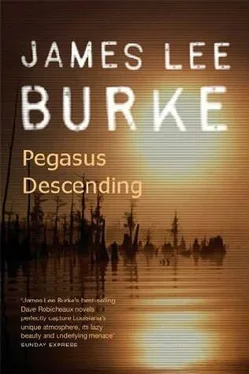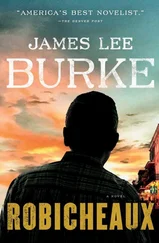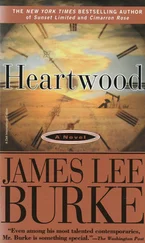A bare-chested black kid, not over seventeen, his shirt wadded up and hanging from his back pocket, tapped on Bello ’s window. His arms were without muscular tone, soft, his chin grown with fuzz that looked like black thread. Bello smiled when he rolled down the window. “Yeah?” Bello said.
“Want some weed?” the kid asked.
“That’s not what I had in mind,” Bello replied.
“You name it, I got it, man,” the kid said, his arm propped on the roof, exposing his armpit. He gazed nonchalantly down the street.
“You gonna hook me up wit’ some cooze?” Bello said.
“There’s a lady or two I can introduce you to.”
“I got a special one in mind,” Bello said, squinting up at him.
“Yeah?”
“Your mama. She still working rough trade?”
The black kid kept his gaze averted and did not look back at him. “Why you want to do that, man?” he said.
“’Cause you put your fucking hand on my car,” Bello said. Then he opened the door and stepped out into the heat. “Want to meet my dog?”
“No, suh,” the boy said, stepping back, lifting his hands in front of him. “T’ought you was someone else, suh.”
Bello snapped his fingers softly and the rottweiler dropped to the asphalt behind him. Bello closed the car door and picked up the animal’s leash. Everyone on the corner was staring at him now, everyone except Monarch Little, who continued eating his sno-ball with his tiny wood spoon, digging out the last grains of spearmint-flavored ice from the bottom of the cone.
Bello stepped up on the curb. The wind puffed the oak tree overhead, and tiny yellow leaves drifted down into the shade. Monarch’s cousin rose from the table and walked to a trash barrel by his truck and dropped his empty sno-ball cone inside. The cousin’s strap overalls looked made from rags, the weave almost washed out of the fabric. His facial expression was bladed, filled with cautionary lights.
“Been t’inking about me?” Bello said to Monarch.
“Don’t know who you are. Ain’t interested, either,” Monarch replied.
“You fixing to find out. You should have stayed in jail, yeah.”
Monarch seemed to think a long time before he spoke. “I ain’t did it. That dog ain’t gonna make me say I did, either. The people on this corner ain’t gonna hurt you, so you ain’t got to be afraid. But don’t come down here no more t’reatening people wit’ dogs, no.”
“My son was gonna be a doctor. You took that from me,” Bello said.
Monarch waved an index finger back and forth. “I ain’t took nothing from you. Do what you gonna do. But you better look around you. This ain’t your pond. Now, I’m walking away from here. I don’t want no trouble.”
Monarch got up from the table, a net of sunlight and shadow sliding over his skin.
That’s when Bello unsnapped the leash from the rottweiler’s choke chain and said, “Sic le neg!”
The dog took only two bounds before it was airborne and aimed right at Monarch’s chest. Monarch twisted away and wrapped his arms across his face, waiting for the dog’s teeth to sink into his flesh. Instead, he felt a suck of air past his head and heard metal whang on bone. Then the dog’s great weight bounced off him, and when he opened his eyes, the dog lay in the dust, its body quivering, its fur split across the crown of its skull.
Monarch’s cousin lowered the shovel he had used on the dog, pointing its tip into the dirt, letting his callused palm slip down the shaft. One of his eyes constantly watered, and he pressed a handkerchief into the socket, all the time watching Bello with his other eye, so that in an odd way he looked like two people, one managing himself while the other studied an adversary. “A mistake got made here ’cause folks was in hot blood. Don’t mean it got to continue, suh,” he said.
“You tear my dog’s head off and lecture me?” Bello said.
The corner was completely silent except for the wind coursing through the leaves overhead. A locomotive engine blew in the distance, the sound climbing into the hot sky.
“My cousin ain’t done you nothing. You come here blaming us for your grief. Now you got more of it, not less. But it ain’t on us,” Monarch said.
No one could say later what thoughts or perhaps memories went through Bello ’s mind at that moment. Did he remember a kid with a shoe-shine box waiting in the cold at the Southern Pacific station? Or the one who worked for tips at the root beer drive-in, where the owner did not allow him to eat his lunch or supper inside the building? Or did he realize, at that particular moment, that no matter what he accomplished in life, he would never separate himself from that class of white men who were considered by other whites to be no better on the social ladder than Negroes and, worse yet, considered even less in stature by people of color themselves?
He ripped into Monarch with both fists. But once again Bello had misjudged both his situation and his adversary. Monarch slipped the first punch, ate the second one, then got Bello in a bear hug, pinning his hands at his sides, crushing the air from his lungs. Bello struggled helplessly against Monarch’s huge arms, his body pressed hard against Monarch’s girth, his shoes leaving the ground.
“Tear him up, Monarch!” somebody yelled.
But instead Monarch wrestled Bello against the Buick, trapping him there, holding him tight against the hot metal while sheriff’s deputies spilled out of three cruisers, Monarch’s sweat mixing with Bello’s inside a cone of heat and dust and the smell of engine oil and rubber tires. The expression of despair and loss and a lifetime of impotent rage on Bello ’s face was one I will never forget. No greater injury could have been imposed upon him. A black man had not only bested him in public but had treated him with mercy and pity while others watched, a deed that Bello was incapable of forgiving.
THE NEXT MORNING, Lonnie Marceaux buzzed my extension and said he wanted to see me in his office. When I got there, a barber was wiping shaving cream from Lonnie’s sideburns and snipping hair out of his nose. The barber held up a mirror for Lonnie to examine his work. Lonnie touched at a spot by his hairline. “Just a tad more on top,” he said.
The barber used his comb and clippers briefly, then held up the mirror again.
“No challenge is too much for your talents, Robert. Thanks for coming over,” Lonnie said. He handed the barber three ten-dollar bills held crisply between two fingers.
The barber thanked him and folded the apron carefully so that no hair dropped on the floor, then nodded at me and left the room.
“I have a crowded schedule some days,” Lonnie said, looking at a steel pocket mirror he kept in his desk drawer.
“It’s that time of year,” I said.
He didn’t make the connection. In fact, I didn’t care whether or not there was one to make.
“Bellerophon Lujan is in jail?” he said.
I looked at my watch. “He’s probably out by now.”
He made a tent out of his hands and patted the pads of his fingers against one another, a thought buried like an insect between his eyes. “We’re getting reports on this friend of yours, Clete Purcel. Evidently he caused some massive property damage at the casino in New Orleans.”
“Then that’s between him and them.”
“Not if he’s inserting himself into one of our investigations.”
“You’ll have to take that up with Clete.”
“I don’t need to. I have you. You’re the other half of the coin.”
“You brought me over here about Clete Purcel?”
“You’re not hearing me. I got a call from a couple of guys in New Orleans, fraternity brothers who have interests in common with Colin Alridge and want to know why Purcel was hassling their boy in the tearoom at the Pontchartrain Hotel.”
Читать дальше












